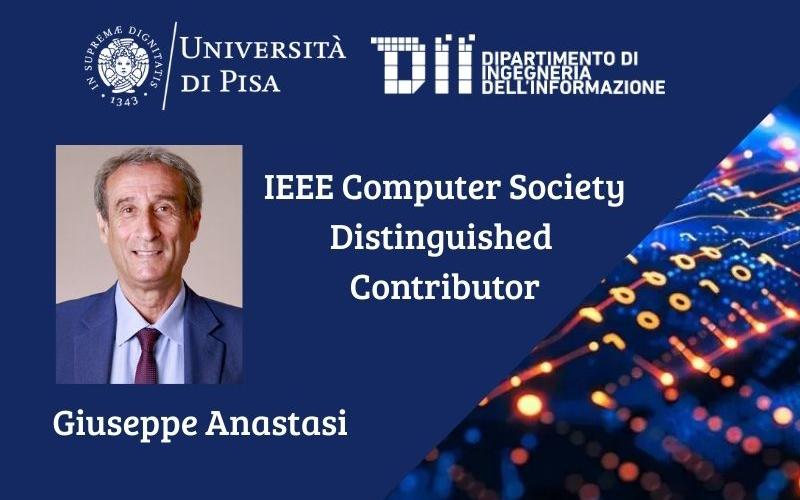La nomina a Distinguished Contributor (DC) premia i membri e gli affiliati della Computer Society che hanno apportato contributi tecnici significativi e continuativi alla IEEE Computer Society, alla...
Leggi tuttoTALENT

Responsabile: Prof. Francesco Marcelloni.
Responsabile coordinamento gruppo di lavoro: Ing. Alessio Bechini
Università di Pisa
Dipartimento di Ingegneria dell’Informazione
Progetto finanziato nel quadro del POR FESR 2014-2020
Bando RS 2 2017 - Progetti di ricerca e sviluppo delle MPMI
Progetto: TALENT
Progettazione e sviluppo di un Sistema di Business InteLLigence per Aziende Industria 4.0, con funzionalità di collaboration e automatic interaction e di Big Data Analytics e machine learning per estrarre conoscenza e realizzare analisi predittive integrando Big Data acquisiti dal Web e da architetture Internet of Things.
![]()
Nella strategia Industria 4.0 è centrale il ruolo di figure professionali in possesso di nuovi insiemi di competenze, sia legate agli aspetti tecnici specialistici (competenze verticali o hard skill) sia riferite alle qualità individuali della persona, all’atteggiamento in ambito lavorativo, alle capacità comunicative e relazionali ecc. (competenze trasversali o soft skill). Ad esempio, nell’Information Tecnology, è indispensabile la presenza di tali professionalità per l'analisi avanzata e strutturata dei processi di produzione, della raccolta/classificazione/elaborazione di grande quantità di dati provenienti da sistemi interni all'azienda e dal mondo esterno. Il processo di selezione e valutazione di queste nuove professionalità (recruitment), a sua volta parte della stessa Industria 4.0, presenta notevoli difficoltà e necessita di strumenti informatici di supporto efficienti e flessibili.
A partire dagli anni ‘90 si è assistito ad una continua evoluzione degli strumenti cosiddetti di “di e-recruiting”; lo stato dell’arte attuale è rappresentato dagli Applicant Tracking System (ATS), ovvero sistemi integrati, concepiti per gestire tutti gli aspetti del processo di recruitment.
Gli ATS evidenziano però limitazioni prestazionali in termini di efficienza di profilazione della domanda e dell’offerta di lavoro e di matching fra le due per selezionare i candidati migliori, che si traducono in inefficienza (necessità di ripetere le selezioni) e possibilità di “skill mismatch” per errori di profilazione con conseguente perdita di opportunità di impiego.
Per affrontare queste limitazioni il team di progetto (IT Partner Italia, Software Products Italia, Promos, Laborplay, Dipartimento di Ingegneria dell’Informazione di UniPi) propone nel progetto TALENT la realizzazione e sperimentazione di uno Smart-ATS di nuova generazione con l’impiego di: tecnologie di web crawling e text mining per la ricerca e l’analisi di richieste e di offerte di lavoro, algoritmi di data mining e machine learning per la profilazione delle richieste e delle offerte e per l’individuazione del matching ottimale tra i profili. Il sistema sarà dotato di funzionalità automatiche per la valutazione delle hard e soft skill, queste ultime particolarmente importanti per supportare le evoluzioni delle aziende secondo la strategia Industria 4.0.
L’innovatività dell’idea progettuale risiede nella concezione generale del Sistema Smart-ATS e nella sua capacità di integrare informazioni su richieste e offerte di lavoro, informazioni di contesto, valutazioni di skill, ecc., per arrivare ad un matching avendo una ricchezza di informazioni tale da garantire una elevata probabilità di successo di reclutamento, in termine di persone realmente assunte rispetto alle liste di persone selezionate. I modelli di profilazione, skill assessment, contestualizzazione e matching che saranno studiati, realizzati e sperimentati nel corso del progetto costituiranno ulteriori elementi di innovazione.
Il Dipartimento di Ingegneria dell’Informazione porterà nel progetto le sue competenze su natural language processing, data mining e machine learning.
![]()
Industry 4.0 requires professionals in possession of new skills related to both specialized technical aspects (vertical skills or hard skills), and individual qualities, such as attitude at work, communication and relational skills (transversal skills or soft skills). For example, in Information Technology, the presence of these professionals is essential for the advanced and structured analysis of production processes, the collection / classification / processing of large amounts of data collected from internal systems within the company and from the outside world. The selection and evaluation process of these new professionals (recruitment), which in turn is part of the same Industry 4.0, presents considerable difficulties and requires efficient and flexible IT support tools.
Since the 1990s, there has been a continuous evolution of the so-called "e-recruiting" tools; the current state of the art is represented by the Applicant Tracking Systems (ATSs), i.e. integrated systems, designed to manage all aspects of the recruitment process.
The ATSs, however, show limitations in terms of efficiency and effectiveness in profiling the labour supply and demand, and in matching between them to select the best candidates. These limitations result in inefficiency (need of repeating the selections) and possibility of "skill mismatch" due to profiling errors with consequent loss of employment opportunities.
To overcome these limitations, the team (IT Partner Italy, Software Products Italy, Promos, Laborplay, Department of Information Engineering of the University of Pisa) of the TALENT project aims to develop and test a novel Smart-ATS based on the use of web crawling and text mining technologies for the research and analysis of job requests and offers, data mining and machine learning for profiling requests and offers and for the design of the optimal matching between the profiles. The system will be equipped with automatic functions for the evaluation of hard and soft skills, the latter particularly important to support the evolution of companies according to the Industry 4.0 strategy.
The innovativeness of the project lies in the architecture of the Smart-ATS and in its ability to integrate information on job requests and offers, context information, skill assessments, etc., to achieve a matching having a wealth of information to guarantee a high probability of successful recruiting, in terms of people actually hired compared to the lists of selected people. The profiling, skill assessment, contextualization and matching models that will be studied, realized and tested during the project will constitute further elements of innovation.
The Department of Information Engineering will bring its expertise on natural language processing, data mining and machine learning into the project.




